Atlantic Monthly Contributors's Blog, page 333
October 2, 2015
Hurricane Joaquin May Not Be That Into U.S.

In spite of some very premature comparisons to Sandy, new projections show Hurricane Joaquin appears to be heading east and may not make landfall in the United States. Different models gaming out the path of the Category-4 storm were initially split on their forecasts, but as the storm has stalled over the Bahamas, the likelihood of it reaching the U.S. is growing more remote.
“If this forecast holds, Hurricane Joaquin will yield one clear winner: the model from the European Center for Medium-Range Weather Forecasts — or simply, the European model — which consistently forecast that Joaquin would head off to sea,” writes Nate Cohn at The New York Times. The model successfully predicted Hurricane Sandy’s unusual path three years ago.
Even if Joaquin misses the East Coast, extreme weather including heavy rain and winds as well as some flooding are still to be expected. “Flood advisories and warnings stretch from North Florida to Connecticut and as far west as parts of West Virginia, Kentucky and Tennessee,” CNN reported.
Coastal South Carolina, particularly Charleston, is preparing for flash floods. Ahead of more rain, South Carolina and Maryland joined Virginia, North Carolina, and New Jersey in declaring states of emergency.
Governor Nikki Haley has declared a State of Emergency, agencies directed to prepare together for #Joaquin & major flooding #sctweets #alert
— SCEMD (@SCEMD) October 1, 2015









Why Conservatives Mistrust Even Modest Efforts at Gun Control

Here we are again: Another massacre, another discussion about gun control—not about instituting new gun controls, mind you, but about why such new regulations are almost certainly dead on arrival.
An angry but resigned President Obama lashed out Thursday night. “We’ve become numb to this,” he said. “We talked about this after Columbine, Blacksburg, Tucson, Newtown, Aurora, after Charleston …. This is a political choice that we make, to allow this to happen every few months in America.”
While Obama has repeatedly called for new gun controls, those attempts have hit a wall in Congress. Furthermore, of the gun laws enacted at the state level since the Newtown massacre, more have actually loosened restrictions than tightened them. Firearm production and sales have also increased since Obama took office.
The common liberal explanation for why this has happened is the entrenched power of the gun lobby—the National Rifle Association and gun manufacturers. This isn’t wrong. The NRA’s power is considerable and it is carefully and effectively wielded. But focusing exclusively on the lobbying angle overlooks the very real fear and distrust with which many gun owners regard the government that drives much of the opposition to gun laws. Many of them simply don’t believe that enhanced background checks—or whatever other modest changes are proposed—are what they appear to be.
Take it from Joe Manchin, the Democratic senator from West Virginia who was a prime driving force behind the failed early 2013 attempt to pass strong background checks.
“They’re scared this is the first step,” Manchin said at New York Ideas that year. “When you say universal background check, the first thing that comes in the mind of a gun owner is that means registration, and registration means confiscation. ‘I haven’t broken the laws, why do you want to know everything?’”
This distrust helps to explain one of the central paradoxes of the gun-control debate. How can it be that vast majorities of Americans, including gun owners, favor stricter background checks, and yet there’s not the political will to pass them? One reason is that theoretical support for checks is different than trust the Obama administration to institute them. Every time the president changes a stance or exercises presidential power—for example, issuing an executive order to allow DREAMers and their families to stay after saying he couldn’t—it adds fuel to the worry: Look, he said he couldn’t and wouldn’t do this with executive authority. Why should we believe he won’t do the same with guns?
One thing Obama said Thursday particularly triggered this fear. “We know that other countries, in response to one mass shooting, have been able to craft laws that almost eliminate mass shootings,” he said. “Friends of ours, allies of ours—Great Britain, Australia, countries like ours. So we know there are ways to prevent it.”
After a 1996 massacre in Port Arthur, Australia significantly tightened its laws. The legislation “outlawed automatic and semi-automatic rifles, as well as pump-action shotguns. A nationwide gun buyback scheme also saw more than 640,000 weapons turned in to authorities,” NBC explains. (If you have progressive friends on Facebook, you’ve almost certainly seen the viral video of Aussie comedian Jim Jeffries talking about gun control down under.) The mention of Australia is coded language to conservatives, as the writer Charles C.W. Cooke noted:
"But why do you think Obama wants confiscation?" "Because he keeps praising it on national television."
— Charles C. W. Cooke (@charlescwcooke) October 1, 2015
Politically, this may seem absurd. Obama may personally think confiscating guns is a great idea, but there’s no prospect that he could get such a policy enacted into law—and if he did, the Supreme Court’s recent precedents on the Second Amendment make it unlikely the law would stand. No one needs to guess what policy Obama might actually back in Congress, because he already tried: It was modest. And it failed.
Psychologically, however, supporters of gun control ignore this attitude at their own political risk. In fact, the professional advocates have already taken it into account—as Molly Ball reported in 2013, they’ve adopted language intended to be more value- (and fear-) neutral: “gun violence,” “reducing gun violence,” “gun-violence legislation.” (Not that it’s helped them much.)
Do gun lobbyists work to encourage and exploit this fear? Of course they do. Here’s a series of recent emails on the mailing list of the National Association of Gun Rights, which split from the NRA because it considered the older organization too soft:

But even if these worries about confiscation seem politically misplaced, and even they are encouraged by political advocates (psychological persuasion is, after all, what political advocates on all sides do), that doesn’t mean they are fake or easily dismissed. Any attempt to reform gun laws will have to grapple with this fear of government.









October 1, 2015
Joaquin Intensifies

Updated on October 1 at 4:52 p.m.
On Thursday afternoon, as Hurricane Joaquin continued to gather steam, the National Hurricane Center upgraded the storm to a Category-4 classification. According to reports, the storm now has registered maximum winds of 130 miles-per-hour around the Bahamas.
Officials are now beginning to prepare for the possibility of the storm making landfall and potentially causing serious damage. Three states—Virginia, New Jersey, and North Carolina—preemptively declared states of emergency on Thursday afternoon, using some very precise language.
I've declared a State of Emergency ahead of this storm.
— Governor Christie (@GovChristie) October 1, 2015
“We’re hoping for the best, but hope is not preparation nor is it a plan,” said North Carolina Governor Pat McCrory in a statement.
Citing the storm, Donald Trump also canceled a rally set for Friday evening in Virginia Beach, Virginia.
As Reuters notes, computer models are forecasting different trajectories for the storm, some of which project Joaquin making brief landfall in the mid-Atlantic states, weakening, and moving offshore while another predicts the storm will change course and remain out at sea.
Almost as quickly as it first appeared on radar, Hurricane Joaquin has become an increasing concern for Americans on the East Coast.
A Mass Shooting in Oregon

Updated on October 1 at 4:52 p.m. ET
There are confirmed injuries and fatalities at a community college in Oregon after a gunman opened fire on campus, a local law-enforcement official said at a news conference.
Douglas County Sheriff John Hanlin said the gunman was killed in an exchange of fire with law-enforcement officers who rushed to Umpqua Community college in Roseburg. He said no officers were injured.
Governor Kate Brown said the gunman was 20 years old. She expressed her “profound dismay” at the incident.
KVAL-TV, a CBS affiliate in Eugene, Oregon, quoted an Oregon State Police spokesman as saying between seven and 10 people are dead. CNN, also quoting a spokesman, put the number of dead at 10. Other local news sources cited a higher death toll and Ellen Rosenblum, the state’s attorney general, said on MSNBC that 13 people had been killed.
The Douglas County Sheriff's Department said report of the shooting was received at about 10:38 a.m. local time, prompting a massive police response.
Authorities bused the students to the Douglas County Fairgrounds, local media reported. The community college, about 70 miles south of Eugene, Oregon, has about 3,000 students.
Congressman Peter DeFazio, Democrat of Oregon, whose district includes Roseburg tweeted:
My thoughts and prayers are with the victims of today's tragic shooting in Roseburg: https://t.co/O4lF8YcnVy
— Rep Peter DeFazio (@RepPeterDeFazio) October 1, 2015









The 2016 U.S. Presidential Race: A Cheat Sheet

Political reporters are like sharks: No one likes them, you don’t want to see them at the beach, and once they smell blood in the water, they start circling. Hence two big stories this week: the continuing Joe Biden campaign watch, and the mounting Rand Paul death watch.
Every day that Hillary Clinton continues to struggle to put her email scandal behind her and change the subject, the pitched speculation about a Joe Biden run for president seems to increase. Several times a week, there seem to be new reports about Biden edging toward a run. (How near can he get? Does his proximity to a run keep increasing, asymptotically?) This week, CNN said it would hold a chair for the vice president to compete in the first Democrat debate until as late as the day of the debate, October 13. No dice: On Thursday, CNN itself reported that Biden won’t decide before the debate, but in the second half of October. These are only the latest revisions to a timeline that keeps moving back.
Meanwhile, Scott Walker’s departure has observers eagerly wondering who will exit the Republican race next. For now speculation seems to be focused on Rand Paul, the senator from Kentucky. Once deemed America’s most interesting politician by the mainstream media, he’s been unable to arouse similar interest among voters or donors. Donald Trump predicts on Twitter that Paul will drop out soon (caveat emptor.) A Paul-supporting super PAC has stopped raising money; his own campaign picked up just $2.5 million in the most recent quarter. He risks failing to qualify for the main stage at the next Republican debate, which would make him the first candidate to be demoted to the second-tier debate. Even the beleaguered Republican candidate for governor in Kentucky, for whom Paul is campaigning soon, wouldn’t commit to supporting him. Paul says he’s not going anywhere, which could mean he’s not going anywhere, or that he’s on the verge of departure.
The other big story now is the release of preliminary fundraising reports—and particularly the huge tallies from supposed longshot candidates Ben Carson, on the Republican side, and Bernie Sanders, who’s just a few million behind Hillary Clinton on the Democratic side.
With so many candidates in the mix, it’s tough to keep track of it all. To help out with that, this cheat sheet on the state of the presidential field will be periodically updated throughout the campaign season. Here's how things look right now.
* * *
The Democrats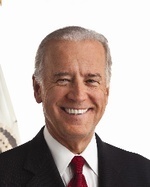 Wikimedia [image error]
Joe Biden
Wikimedia [image error]
Joe Biden
Who is he? Biden is vice president, and the foremost American advocate for aviator sunglasses and passenger rail.
Is he running? Biden is wrestling with that question. He seems to be grappling with a very real, human set of questions: On the one hand, he's always wanted to be president, and this is his last chance to run. On the other, he is concerned about putting his family through the trouble of a run so soon after the death of his son Beau, and he’d face very difficult odds. A top aide has been contacting Democratic donors, asking them to at least keep an open mind until Biden makes a final choice.
Who wants him to run? The original driving force for the run seems to have been Beau Biden, along with his brother Hunter. Within the Biden camp, former Chief of Staff Steve Ricchetti is said to be the central force. Outside, the group Draft Biden (slogan: “I’m Ridin’ With Biden”) has gained new momentum, and Democrats rattled by Hillary Clinton campaign’s struggles see him as a potential alternative.
Can he win the nomination? Even with Clinton’s recent struggles, it’s hard to imagine Biden beating her in a primary. The two candidates would likely share some weaknesses, and at 72, Biden would also be an unusually elderly candidate.
When will he announce? The second half of October, per CNN. The date keeps getting pushed back. “It's not like I can rush it,” Biden has said.
 Wikimedia [image error]
Lawrence Lessig
Wikimedia [image error]
Lawrence Lessig
Who is he? Lessig is a professor at Harvard Law School, political activist, and occasional Atlantic contributor. Lessig’s signature cause is campaign-finance reform, but he also advocates for looser copyright restrictions and has proposed a constitutional convention to modernize the nation's founding document.
Is he running? Yes. He announced an exploratory committee on August 11 and pledged to enter the race if he raises $1 million by Labor Day, which he’s done.
Who wants him to run? Lessig’s campaign is designed to cater almost exclusively to the many Americans who are upset about the influence of money in politics. He is pitching himself as a “referendum president” whose sole purpose would be to pass his proposed Citizens Equality Act of 2017, which would enact universal voting registration, campaign-finance limits, and anti-gerrymandering provisions. As Lessig noted in The Atlantic, many people are angry but no one thinks change is possible. Overcoming that barrier is his signal challenge. (He was also a law clerk to Antonin Scalia, but don’t expect that to garner him much Republican support.)
Can he win the nomination? The track record of Lessig’s Mayday PAC in the 2014 election suggest that he has not yet mastered the trick of marrying his ideas to practical politics.
What else do we know? In a season 6 episode of The West Wing, a fictional Lessig (played by Christopher Lloyd) worked with the White House to write a new constitution for Belarus.
Does his website have a good 404 page? “Sorry, we're too busy fixing democracy to design a clever 404 page!” Lessig’s earnest candidacy, in a single sentence.
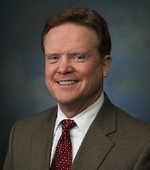 Wikimedia [image error]
Jim Webb
Wikimedia [image error]
Jim Webb
Who is he? Webb is a Vietnam War hero and secretary of the Navy. The author of several books, he served as a senator from Virginia from 2007 to 2013.
Is he running? Yes, as of July 2.
Who wants him to run? Dovish Democrats; socially conservative, economically populist Democrats; the Anybody-But-Hillary camp.
Can he win the nomination? Very doubtful. While Webb was the perfect candidate for Senate from Virginia in 2006, his statement in support of the Confederate flag shows why he probably has little hope in the national Democratic Party.
What else do we know? Read Webb’s longtime friend James Fallows on why he wants Webb in the race.
Does his website have a good 404 page? No.
 Wikimedia [image error]
Hillary Clinton
Wikimedia [image error]
Hillary Clinton
Who is she? As if we have to tell you, but: She’s a trained attorney; former secretary of State in the Obama administration; former senator from New York; and former first lady.
Is she running? Yes.
Who wants her to run? Most of the Democratic Party.
Can she win the nomination? A better question is whether she can lose it.
What else do we know? The real puzzler, after so many years with Clinton on the national scene, is what we don't know. Here are 10 central questions to ask about the Hillary Clinton campaign.
Does her website have a good 404 page? If you’re tolerant of bad puns and ’90s ’80s outfits, the answer is yes.
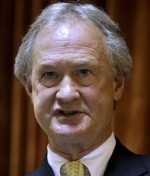 Steven Senne / AP [image error]
Lincoln Chafee
Steven Senne / AP [image error]
Lincoln Chafee
Who is he? The son of beloved Rhode Island politician John Chafee, Linc took his late father’s seat in the U.S. Senate, serving as a Republican. He was governor, first as an independent and then as a Democrat.
Is he running? Yes—he announced his run at George Mason University on June 3.
Who wants him to run? Beyond metric-system boosters? No one knows! Even in Rhode Island, Chafee doesn’t have much support—he opted not to seek re-election as governor in 2014, in part because his approval rating had reached a dismal 26 percent.
Can he win the nomination? No. Chafee seems to be positioning himself as an economic populist and says Clinton's 2002 vote for the Iraq war should disqualify her (he was the only Republican senator to vote against it). In other words: He's Jim Webb with a less impressive resume, a less compelling bio (he's the son of longtime Senator John Chafee), and less of a political base. He gives himself even odds, though.
Does his website have a good 404 page? No.
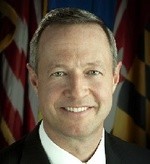 Wikimedia [image error]
Martin O'Malley
Wikimedia [image error]
Martin O'Malley
Who is he? He’s a former governor of Maryland and mayor of Baltimore.
Is he running? Yes. He announced his campaign on May 30.
Who wants him to run? Not clear. He has some of the leftism of Bernie Sanders or Elizabeth Warren, but without the same grassroots excitement.
Can he win the nomination? Probably not. At the moment, O’Malley seems caught between Sanders, who has grasped the progressive mantle, and Clinton, who dominates the Democratic race overall. It’s hard to see where O'Malley would get an opening unless Clinton’s campaign fell apart. The conventional wisdom since protests over the death of Freddie Gray is that protests in Baltimore undermine the case for his candidacy and make it harder for him to run. Recently, he has feuded with Democratic National Committee Chair Debbie Wasserman Schultz, accusing the party apparatus of being in the tank for Clinton.
What else do we know? Have you heard that he plays in a Celtic rock band? You have? Oh.
Does his website have a good 404 page? No.
 Wikimedia [image error]
Bernie Sanders
Wikimedia [image error]
Bernie Sanders
Who is he? A self-professed socialist, Sanders represented Vermont in the U.S. House from 1991 to 2007, when he won a seat in the Senate.
Is he running? Yes. He announced April 30.
Who wants him to run? Far-left Democrats; Brooklyn-accent aficionados; progressives who worry that a second Clinton administration would be far too friendly to the wealthy.
Can he win the nomination? When Sanders launched his campaign, this question seemed more or less beside the point. That’s no longer true: Sanders is running neck and neck or even ahead of Clinton in key early primary states and regularly drawing larger crowds than her. It remains extremely difficult to see him winning the nomination—as Dems from Howard Dean to George McGovern can remind you, primary voters tend to gravitate to “electable” general-election candidates alone.
Does his website have a good 404 page? Yes, and it is quintessentially Sanders.
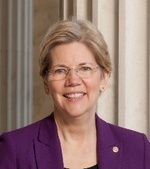 Wikimedia [image error]
Elizabeth Warren
Wikimedia [image error]
Elizabeth Warren
Who is she? Warren has taken an improbable path from Oklahoma, to Harvard Law School, to progressive heartthrob, to Massachusetts senator.
Is she running? No. Seriously, no.
Who wants her to run? Progressive Democrats; economic populists, disaffected Obamans, disaffected Bushites.
Can she win the nomination? No, because she's not running.
* * *
The Republicans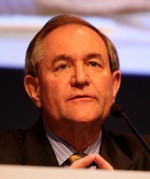 Gage Skidmore
Jim Gilmore
[image error]
Gage Skidmore
Jim Gilmore
[image error] Who is he? Right? Gilmore was governor of Virginia from 1998 to 2002. Before that, he chaired the Republican National Committee for a year. In 2008, he ran for Senate in Virginia and lost to Mark Warner by 31 points.
Is he running? Yes. He filed his papers on July 29.
Who wants him to run? Who knows? Gilmore ran for president briefly during the 2008 cycle before switching to the Senate race. There’s not exactly a groundswell for him this time, either. He says he has experience with national security and the economy that other Republican candidates don’t, and if he’s talking about Trump, it’s hard to disagree.
Can he win? Nah.
Does his website have a good 404 page? Nah.
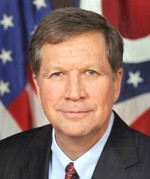 Wikimedia
John Kasich
[image error]
Wikimedia
John Kasich
[image error] Who is he? The current Ohio governor ran once before, in 2000, after a stint as Republican budget guru in the House. Between then and his election in 2010, he worked at Lehman Brothers. Molly Ball wrote a definitive profile in April.
Is he running? Yes. His announcement was July 21 at Ohio State University in Columbus.
Who wants him to run? Kasich’s pitch: He’s got better fiscal-conservative bona fides than any other candidate in the race, he’s proven he can win blue-collar voters, and he’s won twice in a crucial swing state.
Can he win the nomination? Jeb Bush’s slippage might create a good opening for Kasich: He’s an executive with conservative bonafides but establishment appeal. But Kasich has a penchant for alienating the Republican base, so it remains to be seen whether he’s the perfect substitute for Bush or just the Jon Hunstman of this cycle—a moderate Republican governor beloved of the media but not voters.
What else do we know? John Kasich bought a Roots CD and hated it so much he threw it out of his car window. John Kasich hated the Coen brothers’ classic Fargo so much he tried to get his local Blockbuster to quit renting it. George Will laughed at him. John Kasich is the Bill Brasky of philistinism. John Kasich probably hated that skit, too.
Does his website have a good 404 page? Nope.
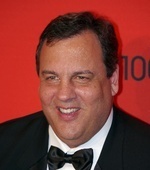 David Shankbone
Chris Christie
[image error]
David Shankbone
Chris Christie
[image error] Who is he? What’s it to you, buddy? The combative New Jerseyan is in his second term as governor and previously served as a U.S. attorney.
Is he running? Christie kicked off his campaign June 30 at Livingston High School, his alma mater.
Who wants him to run? Moderate and establishment Republicans who don't like Bush or Romney; big businessmen, led by Home Depot founder Ken Langone.
Can he win the nomination? No. The tide of opinion had turned against Christie even before the "Bridgegate" indictments. Citing his horrific favorability numbers, FiveThirtyEight bluntly puns that “Christie's access lanes to the GOP nomination are closed.”
Does his website have a good 404 page? We would have gone with the GIF, but sure.
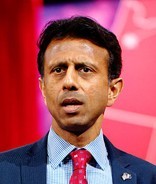 Gage Skidmore
Bobby Jindal
[image error]
Gage Skidmore
Bobby Jindal
[image error] Who is he? A Rhodes Scholar, he’s the outgoing governor of Louisiana. He previously served in the U.S. House.
Is he running? Yes. He kicked off his campaign on June 24.
Who wants him to run? It’s hard to say. Jindal has assiduously courted conservative Christians, both with a powerful conversion story (he was raised Hindu but converted to Catholicism in high school) and policies (after other governors reversed course, he charged forward with a religious-freedom law). But he still trails other social conservatives like Ted Cruz and Mike Huckabee.
Can he win the nomination? Probably not. Jindal still lacks traction at the national level, he faces an overcrowded field of social conservatives, and his stewardship of Louisiana has come in for harsh criticism even from staunch fiscal conservatives. It’s hard to see how he gains momentum from here.
What else do we know? In 1994, he wrote an article called “Physical Dimensions of Spiritual Warfare,” in which he described a friend’s apparent exorcism.
Does his website have a good 404 page? Meh. Good joke, but past its expiration date.
 Gage Skidmore
Donald Trump
[image error]
Gage Skidmore
Donald Trump
[image error] Who is he? The real-estate developer and reality-TV star fired TV personality almost certainly isn’t worth as much as he wants you to think he is.
Is he running? Is he ever! Surprising his rivals, the press, and—one suspects—himself, The Donald is the biggest political story in America.
Who wants him to run? A shocking portion of the Republican primary electorate; Democrats; white supremacists. The rest of the Republican field, along with its intellectual luminaries, however, seem horrified.
Can he win the nomination? For the first time in a long time, the trend is downward for Trump. But he’s still leading the field, so ...
 What else do we know? He cheats at golf, probably.[image error]
What else do we know? He cheats at golf, probably.[image error]  Gage Skidmore
Jeb Bush
[image error]
Gage Skidmore
Jeb Bush
[image error] Who is he? The brother and son of presidents, he served two terms as governor of Florida, from 1999 to 2007.
Is he running? Yes, as of June 15.
Who wants him to run? Establishment Republicans; George W. Bush; major Wall Street donors.
Can he win the nomination? Soon after Bush entered the race, predictions of a Bush-Clinton rematch of 1992 were common. Now, it’s hard to say. Clinton has stumbled, and so has Bush. He now lags well behind Trump, and has hit some fundraising turbulence (ironically caused, it seems, by his early prowess). Trump continues to treat Bush as his main rival, saving his most vicious attacks for Bush. There’s an amorphous expectation that once Trump’s bubble bursts, Bush will regain some altitude. But no one knows exactly how that would work, or how it will happen. Bush remains more moderate than much of the Republican primary electorate (especially on immigration—as the Trump boom has highlighted), his name remains a double-edged sword, and he just doesn’t look all that comfortable or joyous on the trail.
Does his website have a good 404 page? Yes—y en español también.
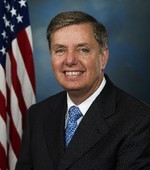 Wikimedia
Lindsey Graham
Wikimedia
Lindsey Graham
Who is he? A senator from South Carolina, he’s John McCain’s closest ally in the small caucus of Republicans who are moderate on many issues but very hawkish on foreign policy.
Is he running? He sure is. Graham kicked off the campaign June 1.
Who wants him to run? John McCain, naturally. Senator Kelly Ayotte, possibly. Joe Lieberman, maybe?
Can he win the nomination? Not really. The South Carolina senator seems to be running in large part to make sure there’s a credible, hawkish voice in the primary. It seems like Graham started his campaign almost as a lark but has started to enjoy the ride, plus he’s shown he’s a great performer on the stump. Molly Ball explores his chances at greater length here.
What else do we know? Graham promises to have a rotating first lady if he wins. We nominate Lana del Ray.
 Michael Vadon
George Pataki
[image error]
Michael Vadon
George Pataki
[image error] Who is he? Pataki ousted incumbent Mario Cuomo in 1994 and served three terms as governor of New York.
Is he running? Yes. He announced May 28.
Who wants him to run? It's not clear. Establishment Northeastern Republicans once held significant sway over the party, but those days have long since passed.
Can he win the nomination? No. As my colleague Russell Berman previously noted, Pataki is one of the longest of the long-shot GOP candidates. He has touted his leadership on 9/11, when he served as governor, but so did former New York City Mayor Rudy Giuliani. He was also a successful conservative governor in a deep-blue Northeastern state, but so was former Massachusetts Governor Mitt Romney. He seems to be socially liberal enough to alienate primary voters, but not enough to capture Democrats.
Does his website have a good 404 page? No.
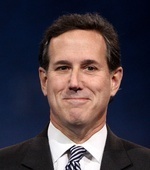 Gage Skidmore
Rick Santorum
[image error]
Gage Skidmore
Rick Santorum
[image error] Who is he? Santorum represented Pennsylvania in the Senate from 1995 until his defeat in 2006. He was the runner-up for the GOP nomination in 2012.
Is he running? Yes, with a formal announcement on May 27.
Who wants him to run? Social conservatives. The former Pennsylvania senator didn't have an obvious constituency in 2012, yet he still went a long way, and Foster Friess, who bankrolled much of Santorum's campaign then, is ready for another round.
Can he win the nomination? It's tough to imagine. As much as Santorum feels he deserves more respect for his 2012 showing, neither voters nor the press seem inclined to give it to him, and he remains trapped in the basement.
Does his website have a good 404 page? No.
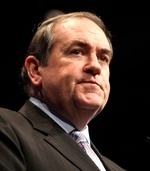 Gage Skidmore
Mike Huckabee
[image error]
Gage Skidmore
Mike Huckabee
[image error] Who is he? An ordained preacher, former governor of Arkansas, and Fox News host, he ran a strong campaign in 2008, finishing third, but sat out 2012.
Is he running? Yes. He kicked off the campaign May 5.
Who wants him to run? Social conservatives; evangelical Christians.
Can he win the nomination? Huckabee's struggle is to prove that he's still relevant. Since he last ran in 2008, a new breed of social conservatives has come in, and he’s had trouble keeping up with fresher faces like Ted Cruz and Ben Carson. His brand of moral crusading feels a bit out of date in an era of same-sex marriage—not least when he curiously chose to attack Beyoncé. Huckabee’s answer has been to play as a populist, but that has its own pitfalls: He faces fire from strict conservative groups for tax hikes while he was governor.
Does his website have a good 404 page? It’s pretty good.
 Gage Skidmore
Ben Carson
[image error]
Gage Skidmore
Ben Carson
[image error] Who is he? A celebrated former head of pediatric neurosurgery at Johns Hopkins, Carson became a conservative folk hero after a broadside against Obamacare at the 2013 National Prayer Breakfast.
Is he running? Yes. He announced May 4.
Who wants him to run? Grassroots conservatives, who have boosted him up near the top of polls, even as Republican insiders cringe. Carson has an incredibly appealing personal story—a voyage from poverty to pathbreaking neurosurgery—and none of the taint of politics.
Can he win the nomination? History weighs heavily against Carson: Not since Dwight Eisenhower has either party nominated anyone without prior elected experience for the presidency. Nonetheless, Carson has quietly shown impressive staying power and is running second or third in national polls. One challenge is that his politics are eclectic unto near incoherence, and he has a tendency to do things like compare ISIS to the Founding Fathers.
Does his website have a good 404 page? No.
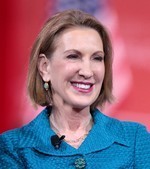 Gage Skidmore
Carly Fiorina
[image error]
Gage Skidmore
Carly Fiorina
[image error] Who is she? Fiorina rose through the ranks to become CEO of Hewlett-Packard from 1999 to 2005, before being ousted in an acrimonious struggle. She advised John McCain’s 2008 presidential campaign and unsuccessfully challenged Senator Barbara Boxer of California in 2010.
Is she running? Yes, as of a May 4 announcement.
Who wants her to run? It isn’t clear exactly what Fiorina’s constituency is, but she’s a business-friendly candidates with a talent for a sharp turn of phrase or jab.
Can she win the nomination? Fiorina has gone from also-ran to huge story, largely on the strength of two debate performances. Her dominant showing at the “kid’s table” in the first GOP debate earned her a spot at the main event for the second, where she was again declared the winner by acclamation. So is she for real? Her first round as a candidate, against Barbara Boxer for Senate in 2010, didn’t turn out so well, so the question is how well she learned the lessons of the licking and can turn them into a more successful campaign.
What else do we know? Fiorina's 2010 Senate race produced two of the most entertaining and wacky political ads ever, "Demon Sheep" and the nearly eight-minute epic commonly known as "The Boxer Blimp."
Does her website have a good 404 page? No.
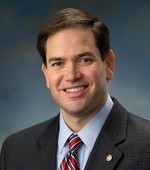 Wikimedia
Marco Rubio
[image error]
Wikimedia
Marco Rubio
[image error] Who is he? A second-generation Cuban-American and former speaker of the Florida House, Rubio was catapulted to national fame in the 2010 Senate election, after he unexpectedly upset Governor Charlie Crist to win the GOP nomination.
Is he running? Yes—he announced on April 13.
Who wants him to run? Rubio enjoys establishment support, and has sought to position himself as the candidate of an interventionist foreign policy.
Could he win the nomination? Charles Krauthammer pegs him as the Republican frontrunner. His best hope seems to be to emerge as a consensus candidate who can appeal to social conservatives and hawks, and he's even sounded some libertarian notes of late. He's well-liked by Republicans, and has surged forward since announcing, but he needs to move up from second choice to first choice for more of them. Rubio seems to scare Democrats more than any other candidate, too. At some point, however, he’ll have to start actually gaining in the polls.
Does his website have a good 404 page? It’s decent.
 Wikimedia
Rand Paul
[image error]
Wikimedia
Rand Paul
[image error] Who is he? An ophthalmologist and son of libertarian icon Ron Paul, he rode the 2010 Republican wave to the Senate, representing Kentucky.
Is he running? Yes, as of April 7.
Who wants him to run? Ron Paul fans; Tea Partiers; libertarians; civil libertarians; non-interventionist Republicans.
Can he win the nomination? Once tabbed by Time as the most interesting man in politics, he has failed to elicit much interest from voters so far. Paul’s unorthodox politics always made him tough to see in the Republican top tier, but he had impressed many observers during his time in the Senate as a wily campaigner. But his campaign seems stuck in neutral. He hasn’t managed to create the enthusiasm he needs among fans of his father, former Representative Ron Paul, still has no fundraising base, and seems to have largely disappeared from view, leaving in his wake lots of “What happened to Rand Paul?” headlines. A good debate in August would have helped him, but he didn’t have it.
Does his website have a good 404 page? No.
 Wikimedia
Ted Cruz
[image error]
Wikimedia
Ted Cruz
[image error] Who is he? Cruz served as deputy assistant attorney general in the George W. Bush administration and was appointed Texas solicitor general in 2003. In 2012, he ran an insurgent campaign to beat a heavily favored establishment Republican for Senate.
Is he running? Yes. He launched his campaign March 23 at Liberty University in Virginia.
Who wants him to run? Hardcore conservatives; Tea Partiers who worry that Rand Paul is too dovish on foreign policy; social conservatives.
Can he win the nomination? Though his announcement gave Cruz both a monetary and visibility boost, he still carries serious weaknesses. Much of Cruz's appeal to his supporters—his outspoken stances and his willingness to thumb his nose at his own party—also imperil him in a primary or general election, and he's sometimes been is own worst enemy when it comes to strategy. But Cruz is familiar with running and winning as an underdog, and he seems to be positioning himself to absorb Trump supporters once the expected (but never explained) Trump collapse occurs.
Does his website have a good 404 page? No.
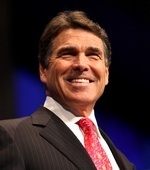 Gage Skidmore
Rick Perry
[image error]
Gage Skidmore
Rick Perry
[image error] Who is he? George W. Bush’s successor as governor of Texas, he entered the 2012 race with high expectations, but sputtered out quickly. He left office in 2014 as the Lone Star State’s longest-serving governor.
Is he running? Yes. He announced on June 4. Perry dropped out of the race on September 11.
Who wanted him to run? Bueller?
Could he have won the nomination? No. Perry promoters insisted that Rick 2016 was a polished, smart campaigner, totally different from the meandering, spacey Perry of 2012. It didn’t seemed to matter in this field. Perry had to quit paying his staff in South Carolina and New Hampshire, and was down to a single staffer in Iowa when he dropped out.
Does his website have a good 404 page? That depends. Is this an “oops” joke? If so, yes.
 Gage Skidmore
Sarah Palin
[image error]
Gage Skidmore
Sarah Palin
[image error] Who is she? If you have to ask now, you must not have been around in 2008. That’s when John McCain selected the then-unknown Alaska governor as his running mate. After the ticket lost, she resigned her term early and became a television personality.
Is she running? A bizarre speech in January made a compelling case both ways.
Who wants her to run? Palin still has diehard grassroots fans, but there are fewer than ever.
Can she win the nomination? No.
When will she announce? It doesn't matter.
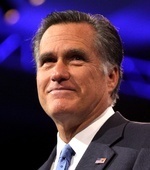 Gage Skidmore
Mitt Romney
[image error]
Gage Skidmore
Mitt Romney
[image error] Who is he? The Republican nominee in 2012 was also governor of Massachusetts and a successful businessman.
Is he running? Probably not, but who knows! He announced in late January that he would step aside, but now New York claims that the Trump boom has him reconsidering.
Who wanted him to run? Former staffers; prominent Mormons; Hillary Clinton's team. Romney polled well, but it's hard to tell what his base would have been. Republican voters weren't exactly ecstatic about him in 2012, and that was before he ran a listless, unsuccessful campaign. Party leaders and past donors were skeptical at best of a third try.
Could he have won the nomination? He proved the answer was yes, but it didn't seem likely to happen again.
 Gage Skidmore John Bolton
Gage Skidmore John Bolton Who is he? A strident critic of the UN and leading hawk, he was George W. Bush’s ambassador to the UN for 17 months.
Is he running? Nope. After announcing his announcement, in the style of the big-time candidates, he posted on Facebook that he wasn’t running.
Who wanted him to run? Even among super-hawks, he didn’t seem to be a popular pick, likely because he had no political experience.
Could he have won the nomination? They say anything is possible in politics, but this would test the rule. A likelier outcome could be a plum foreign-policy role in a hawkish GOP presidency.
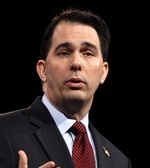 Gage Skidmore [image error]
Scott Walker
[image error]
Gage Skidmore [image error]
Scott Walker
[image error] Who is he? Elected governor of Wisconsin in 2010, Walker earned conservative love and liberal hate for his anti-union policies. In 2013, he defeated a recall effort, and he won reelection the following year.
Is he running? No. Walker dropped out of the race on September 21.
Who wanted him to run? Walker was a favorite of conservatives who detest the labor movement because of his union-busting in Wisconsin. He attracted interest from the Koch brothers, and some establishment Republicans saw him as the perfect marriage of executive know-how, business-friendly credentials, and social conservatism without culture-warrior baggage.
Could he have won the nomination? For months, Walker was considered—along with Jeb Bush and Marco Rubio—a top-tier contender for the nomination. Hurricane Trump hurt all three, but none more than Walker. After largely fading from view during the second presidential debate, he polled below 1 percent in a national CNN poll. Perhaps a radically different campaign would have produced a different result, but Walker didn’t seem ready for national primetime.
Does his website have a good 404 page? Aye, matey.
* * *









Has Taylor Swift Cursed Your Baseball Team?

Over the course of the past several years, baseball fandom in Houston, Texas, has meant deep, dark, and prevailing sorrow.
The last time the Houston Astros made the playoffs was 2005, when they were swept out of their first-ever World Series by the Chicago White Sox. Not only has the team not been back since to the playoffs since, but in 2013, the Astros became the second team in Major League history to lose over 105 games in three consecutive seasons.
This year was meant to be different. In late July, the Astros were on pace for a playoff berth when the team announced that the Taylor Swift concert at the team's stadium had been rescheduled to accommodate a potential playoff run. Baseball is a notoriously superstitious and curse-prone sport. Understandably, this logistical hubris made some fans a little bit nervous:
Don't jinx it! RT "@astros announce new Houston date for Taylor Swift's concert will be Wednesday, September 9 at Minute Maid Park.” #MLB
— Todd Little (@Todd_Little) July 27, 2015
One month later, the Astros had taken over first place in the AL West and had a five-game lead on their in-state rivals, the Texas Rangers. They still held the top spot in September when Taylor Swift performed her rescheduled gig in Houston. And then came the curse.
As D'Arcy Maine at ESPNW notes, “Houston has turned in a lackluster 7-11 record since her [September] concert—including losing seven of the eight games immediately after.” The young team, once poised to storm into the playoffs, is clinging onto life, having lost control of the division and the wild-card spot.
If you're willing to believe in the dark power of Swift, you’ll see that Houston isn’t the only team afflicted. Two days after Swift performed at the Washington Nationals’ ballpark in July, the lights went out during the next home game. Star pitcher Max Scherzer knew who to blame:
Well who was the last one to use Nationals Park last? Taylor Swift.. I blame her for the power outs tonight. We now have #BadBlood
— Max Scherzer (@Max_Scherzer) July 18, 2015
The Nationals—a preseason favorite to reach the World Series—were also poised to make the playoffs when Swift performed in Washington, D.C., holding first place in the National League East.
Maine notes, that since that Swift concert “the team has had an epic collapse—compiling a 32-38 record and being eliminated from the postseason.” In an added jinx, earlier this week, Scherzer, who pitched a no-hitter in June, had another no-hit bid broken up when he was just five outs shy of the feat.
Baseball fans are getting spooked. On Thursday, the Toronto Star fretted aloud about Swift’s two sold-out performances this weekend at the Rogers Centre, where the Toronto Blue Jays play. Twenty-four hours earlier, the team clinched a division title and will be making its first playoff appearance since 1993 when the team won the World Series on Joe Carter’s famous walk-off home run.
The city is understandably excited. Just a few weeks ago, one zealous fan made a viral Blue Jays-themed video parody of “Blank Space,” Taylor Swift’s hit song. The highly produced “First Place,” has lyrics like: Oh my god/Look at this team/Could be better than ‘93.
Those poor fools.









A History of Violence (by Women in Music Videos)
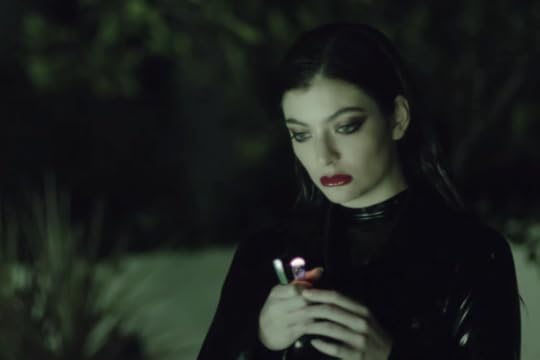
The music video for Disclosure’s “Magnets” ends with the featured vocalist Lorde tying a guy to a chair, pushing that chair into a swimming pool, and then lighting the pool on fire. On Twitter she explained, “one of my life goals has always been ‘to one day play a hitgirl who pretends to seduce then burns alive douchey boyfriends,’” to which her followers exploded in a chorus of “YAS” and “I LOVE YOU” and “can you burn me too?”
“Magnets” would seem to confirm the existence of a trend that Miley Cyrus called out earlier this year when talking about Taylor Swift’s clip for “Bad Blood,” in which a team of women engage in explosive, slicey-dicey warfare. “I don't get the violence-revenge thing,” Cyrus told Marie Claire. “That’s supposed to be a good example?” To the pile of recent instances you can add Swift’s “Blank Space,” in which she bashes a boyfriend’s things and—it’s suggested, though not shown—his body to the point of unconsciousness; Lana Del Rey’s “High by the Beach,” in which the singer uses an enormous gun to blast a paparazzi dude out of the sky; and possibly the biggest bloodbath in mainstream pop history, Rihanna’s “Bitch Better Have My Money,” which depicts the gruesome dismemberment of a crooked accountant and the torture of his wife.
The politics of the genre are, on one level at least, clear: They’re meant to blow up social expectations that women remain passive. But the recent boomlet of murderess music videos doesn’t represent a totally new phenomenon. The stars of Dixie Chicks’s “Goodbye Earl” offed an abusive husband in 1999, Ashanti grimly pondered stabbing an adulterer in 2008’s “The Way That I Love You”, and at least three Lady Gaga shorts—“Paparazzi,” “Bad Romance,” and “Telephone”—feature the poisoning or burning of men. But often, these videos fall into two categories: ones that take place in total fantasy worlds—think Kesha mounting James Van Der Beek’s head on her wall after he hunted one too many unicorns, or Britney Spears as a sci-fi assassin/flight attendant—or ones where the killer’s desperation is so abject that it feels like a Very Special Episode.
Few of the recent crop of such videos quite fit into those categories, though. Justice often is less the point than the thrill and spectacle of violence, just as is usually the case in Hollywood action films and popular video games. In “Magnets,” Lorde isn’t dating the “douchey boyfriend,” nor is she the one being abused by him; she kills the guy on another girl’s behalf, and—dancing around in her slick leather tunic before ignoring his pleas for mercy—seems to relish the task. Taylor Swift’s “Blank Space” rampage is a cheeky overreaction, and “Bad Blood” is a superhero-film sendup where friend and foe alike are mostly women. The joke of “High by the Beach” is that Lana needs a huge rocket-launcher to maintain her chill, while “Bitch Better Have My Money” is all about the comedy of carnage, with the evil banker’s crimes telegraphed only midway through, perfunctorily.
Rihanna offers a nice case study in how mores around music videos, gender, and violence may have subtly shifted over just a few years. In 2011, she released the video for “Man Down,” a classic victim’s revenge tale in which she fires a revolver at her rapist. The video is mostly remembered for the controversy it caused, with the Parents Television Council condemning it as “an inexcusable, shock-only, shoot-and-kill theme song” (a sentiment that’s similar to the one that caused country channels to ban Garth Brooks’s “The Thunder Rolls,” about a woman’s attempted reprisal against an abuser, in the early ’90s). But the PTC has made not a peep about the much gorier “Bitch Better Have My Money” video, perhaps because it—like many new music clips, now that online streaming is the number one way people receive music—was never meant to be shown on TV.
The change in venue has enabled greater levels of explicitness; just three years ago, Christina Aguilera’s “Your Body” video featured male victims who spewed cartoonish blue paint, while today Rihanna lounges in a box of bright-red banker blood. The Internet has shifted the nature of backlash, too. Instead of “what about the children?” protests to the FCC and networks, people write think pieces about whether a given clip is feminist or not. One school of thought says that the violence is an empowerment move that might even help warn off would-be attackers of women; another says it all plays into attitudes about right-through-might that, in the end, can favor male dominance in society.
But most everyone understands that the appearance of misandry or of immoral action is meant to be ironic, knowing—a political corrective in a world where men far more commonly hurt women than vice versa. (Conversely, pop’s men rarely choose to depict themselves attacking women, and when they do it’s with a sense of perverted transgression—Action Bronson’s little-seen but very ghastly “Brunch” video, or The Weeknd’s “Pretty,” in which he shoots up a girl in the act of cheating on him.)
The other factor worth noting is the online war for attention. As music videos have lost their position as cultural canon enforced by MTV and instead just become another piece of content on which users have to decide whether or not to click, headlines about controversy help stand out. There’s already been a boom/bust cycle for music-video “NSFW” nudity; at some point, women-with-weapons clickbaiting may get there too, if it hasn’t already. And then it’s on to the next dare.









The New Politics of Late Night

Jon Stewart might be gone from late night, but his influence is anything but forgotten. In the good old days, the “fake news” model pioneered by The Daily Show was the safest bet for stalwart truth-telling about current events. But these days, thanks to the success of Stephen Colbert and John Oliver and an increasingly dysfunction political system, half of the late-night universe is getting in on the game, none more incisively than Seth Meyers.
On Wednesday, the SNL alum examined a Congressional hearing about Planned Parenthood funding on Late Night.
Meyers has long excelled at political humor from his years chairing “Weekend Update” (and serving as head writer of Saturday Night Live during the 2008 and 2012 presidential elections), and he delivered a memorable turn when emceeing the White House Correspondent’s Dinner in 2011. Still, Late Night, which follows The Tonight Show With Jimmy Fallon, has never been a brand known for topical humor. Under Conan O’Brien, it tended towards the absurd, and Fallon’s emphasis on celebrity stunts and affable recurring sketches helped promote him to the top slot on the network.
But Meyers continues to find his voice on the show—moving his opening monologue behind a desk (to deliver jokes Jon Stewart-style, rather than David Letterman-style), and focusing his attention on longer segments about the news, rather than the short punchlines he was best known for at Saturday Night Live. “A Closer Look” splices the most inane congressional questions asked of the Planned Parenthood president Cecile Richards with Meyers’s glib fact-checking. Recently Meyers used the bit to examine Donald Trump and Ben Carson’s anti-Muslim sentiments, to similar success.
As Stewart and his colleagues proved, there’s a real appetite for longer-form political comedy in the typically pithy late-night world. When Colbert moved his act from Comedy Central to CBS, pundits wondered if he would change his format, but the transition from The Colbert Report to The Late Show has been surprisingly seamless. Meanwhile, Oliver’s Last Week Tonight on HBO has become such a pop-culture phenomenon, it’s spawned its own genre of instantly mockable online content.
Trevor Noah has had a confident start to his time at The Daily Show, but his early ratings so far are relatively soft. Still, for late night, the battle for influence is waged online more than anywhere, and that’s where these instantly shareable seven-minute takedowns of a specific issue can spread like wildfire. That’s why Meyers is wise to focus his perspective to longer political bits—well, that and the fact that he’s really good at it.









More Russian Airstrikes in Syria

Updated on October 1 at 12:06 p.m.
Russia has carried out more strikes in Syria, a day after it began its first foreign military operation outside Europe since its troops left Afghanistan in the late 1980s.
The Defense Ministry’s press service said in a statement that Russian warplanes performed eight sorties, “eliminating the staff of terrorist groupings,” as well as an ammunition depot near Idlib and a “three-level HQ center” near Hama. A plant that made car bombs was destroyed in Homs, it said.
Those “terrorist groupings” likely refers to the Jaish al-Fatah, or Army of Conquest, a group of rebels that includes the al-Nusrah Front, al-Qaeda’s affiliate in Syria; Ahrar al-Sham, a hardline Islamist group; and other relatively moderate Islamist groups. All are opposed to the Islamic State, which is the group that Russia is ostensibly in Syria to target.
Earlier this year, the Army of Conquest captured Idlib city, as well as the province with which it shares a name, from Syrian forces. The region is pivotal not only to Syrian President Bashar al-Assad, whose support base in centered on the coastal region, but also Russia, because Idlib city is only 120 miles northeast of Tartus, where Russia’s sole Mediterranean naval base for its Black Sea fleet is located.
Speaking to reporters at the UN, Sergei Lavrov, the Russian foreign minister said, Russia’s targets were “ISIL, Nusra, and other groups.” He said Russia would only target those groups recognized as terrorist organizations by international law.
The Russian statement said the strikes were coordinated with the Syrian military, which has been fighting a five-year-long civil war against many rebel groups, whose affiliations range from leftist to hard-line Islamist. All are united in their desire to topple Assad, a Russian ally.
Russia’s targeting of groups other than the Islamic State, including those backed by the West, caused friction with the U.S. on Wednesday, the first day of strikes. The Free Syrian Army, the anti-Assad rebel group that is backed by the West, said it was targeted by one of the strikes, adding one of its leaders was killed.
Lavrov told reporters at the UN on Thursday Russia doesn’t “consider FSA a terrorist group. We believe [they] should be part of political process.”
In Washington, Defense Secretary Ash Carter on Wednesday said the Russian mission was “doomed to failure.”
“The result of this kind of action will inevitably simply be to inflame the civil war in Syria,” he said. “It’s ill-advised to take this kind of action in support of Assad, only without pursuing a political transition.”
Secretary of State John Kerry met with his Russian counterpart, Lavrov, at the UN on Wednesday, and called the discussions “constructive.”
“We agreed on the imperative to, as soon as possible, have a military-to-military de-conflicting discussion,” he said.
The Russian strikes began Wednesday just hours after President Vladimir Putin received permission from the upper house of Parliament to use military force overseas. Russia has insisted that ground troops will not be used in Syria. But over the past month, Russia has sent both military personnel and tanks into Syria to aid Assad, and last weekend, Moscow announced an intelligence-sharing agreement with Syria, Iran, and Iraq in their fight against Islamic State.
The Russian action came just days after Putin and President Obama met at the UN. There, Putin called for a broad coalition against the Islamic State; Obama said he was willing to work with anyone, “but we must recognize that there cannot be, after so much bloodshed, so much carnage, a return to the prewar status quo.”
The U.S. and its allies are carrying out their own airstrikes in Syria against the Islamic State, and those strikes will continue, Kerry said. But the U.S. has been reluctant to play a more assertive role in Syria because it fears weapons could fall into the hands of al-Nusrah front and groups like it.









Kunduz Regained?

Fighting continues in the northern Afghan city of Kunduz on Thursday after government forces said they retook the city seized by the Taliban this week.
Afghan forces, who were confined to the city’s airport, launched an overnight counteroffensive to take back Kunduz. The BBC said they were aided by NATO special forces and U.S. air support. Tolo News, a private news channel, reported the Afghan troops were “assisted by U.S. forces” and coalition air support. Afghan military officials told local media hundreds of Taliban insurgents were killed.
A Taliban spokesman denied the city has fallen, insisting their “flag is still flying.”
The fighting is expected to continue until the Taliban can be pushed out of Kunduz city as well as the province of the same name that the group controls.
Tolo News also reported that Afghan military reinforcements were fighting their way to Kunduz along the highway from Baghlan in order to secure the city. The reinforcements are about 30 miles away from the city and are coming under heavy fire from the Taliban. They are also being slowed by ambushes as well as landmines.
After besieging the city of Kunduz for months, the Taliban took control of it this week, giving the group its biggest prize since it was toppled from power after the U.S.-led invasion of Afghanistan in 2001. The northern city is not only an important transportation hub, it was also the Taliban’s northern stronghold before the U.S. invasion.
The Taliban’s victory was seen as a major boost for the group, but also a significant embarrassment for President Ashraf Ghani, who marked one year in office this week. Ghani is trying to bring security to Afghanistan a year after U.S. and NATO troops left the country.









Atlantic Monthly Contributors's Blog
- Atlantic Monthly Contributors's profile
- 1 follower












